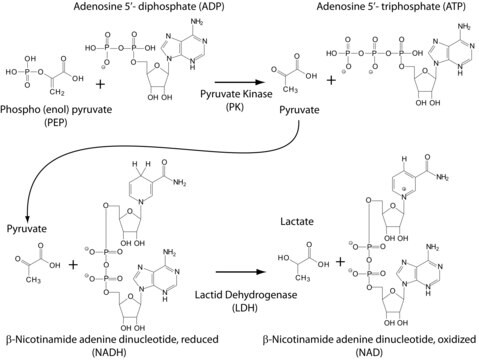MAK274
Triose Phosphate Isomerase Activity Colorimetric Assay Kit
sufficient for 100 colorimetric tests
Sign Into View Organizational & Contract Pricing
All Photos(1)
About This Item
UNSPSC Code:
12352200
NACRES:
NA.84
Recommended Products
detection method
colorimetric
relevant disease(s)
neurological disorders; hematological disorder
storage temp.
−20°C
General description
Triose Phosphate Isomerase (TPI or TIM: EC 5.3.1.1) is an important enzyme for glycolysis. It reversibly interconverts dihydroxyacetone phosphate and glyceraldehyde-3-phosphate, thus maintaining the equilibrium of these two triose phosphates. TPI connects glycolysis to pentose phosphate pathway and lipid metabolism. It is a stable homodimer found in almost all organisms.
Features and Benefits
Compatible with high-throughput handling systems.
Suitability
Suitable for detection of Triose Phosphate Isomerase in animal tissues (muscle, liver, heart, kidney, etc.), cell culture (adherent or suspension cells) and human serum or plasma.
Principle
This Triose Phosphate Isomerase Activity Assay kit provides a quick and easy way for determining triose phosphate isomerase activity in a variety of samples. In this kit, triose phosphate isomerase converts dihydroxyacetone phosphate into glyceraldehyde 3-phosphate, which reacts with the enzyme mix and developer to form a colored product with strong absorbance at 450 nm. The assay is simple, sensitive, and high-throughput, and can detect triose phosphate isomerase activity as low as 40 mU/mL.
Signal Word
Danger
Hazard Statements
Precautionary Statements
Hazard Classifications
Eye Dam. 1 - Skin Corr. 1B
Storage Class Code
8A - Combustible corrosive hazardous materials
Choose from one of the most recent versions:
Certificates of Analysis (COA)
Lot/Batch Number
Don't see the Right Version?
If you require a particular version, you can look up a specific certificate by the Lot or Batch number.
Already Own This Product?
Find documentation for the products that you have recently purchased in the Document Library.
Our team of scientists has experience in all areas of research including Life Science, Material Science, Chemical Synthesis, Chromatography, Analytical and many others.
Contact Technical Service








